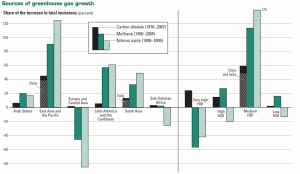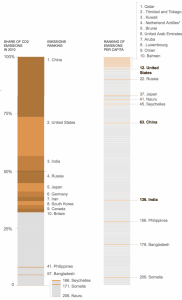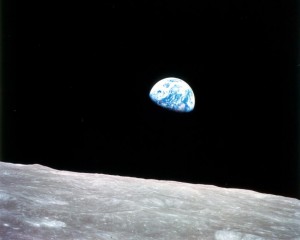By Jesse McElwain
When the United Nations Intergovernmental Panel on Climate Change (IPCC) published its 2007 Impact Report, the IPCC chairman, Rajendra Pachauri, had this to say: “It is the poorest of the poor in the world, and this includes poor people even in prosperous societies, who are going to be the worst hit… This does become a global responsibility in my view.” (Lowrey)

Sources of greenhouse gas growth by region and Human Development Index. Source: UN Development Programme Human Development Report 2011.
There are two primary ways to understand the inherent inequality of climate change. The first is relatively easy to understand: the poorest people of the world will be affected the worst, and by a large margin. The second proposes some ethical challenges, at least when it comes to international relations: developed nations and heavily industrialized countries (like the United States, China, India, Australia, etc.) have produced, and continue to produce, a massive amount of greenhouse gases and pollutants that contribute to climate change, yet do not bear the associated burden. Meanwhile, poor and undeveloped countries generally produce a relatively insignificant amount of greenhouse gases, but, because of a lack of resources, are affected immensely by climate change. For instance, when the coal-burning behavior of a developed country’s energy industry causes a drought to strike in an already arid region of a poor country, that country may not have the emergency resources available to provide for its citizens. On the other hand, developed countries often have emergency funds that can be used in crises for reconstruction and relief efforts. Simultaneously, developed countries and neo-liberal global organizations (like the IMF and World Bank), are encouraging developing poor countries to avoid the same pitfalls that developed countries have already experienced; namely, utilizing inexpensive but polluting energy resources to develop quickly and cheaply. That encouragement has been met with criticism (Myers, et al.). Thus, developed countries are faced with the ethical conundrum of whether to take the blame for contributing so much to climate change and allow developing countries the same freedom to pollute, or to strictly encourage developing countries to walk a different – a greener – path to development. This is not a debate that will be settled anytime soon, though one might encourage all countries to recognize that we are one world, one Earth, and our focus should be on curtailing global emissions, not those from any one classification of country.

2010 CO2 emissions rankings by percentage and per capita. Source: NYTimes.
Clearly, the two understandings are related: the poorest people of the world live in the poorest countries in the world. But this isn’t exclusive; many of the world’s wealthiest countries also have significant impoverished populations, and, likewise, some relatively poor countries are home to a select few wealthy individuals. That said, governments continue to debate what the appropriate and ethical action should be to provide aid to impoverished regions suffering from the effects of climate change while the global situation worsens. Year after year, dignitaries fail to reach consensus at climate change and sustainability summits, a result that cannot persist should we – as a global society – wish to continue to inhabit the planet.
Indeed, many activists agree. Catherine Pearce, a campaigner for the Friends of the Earth, says: “It is now clear that we are to blame for the last 50 years of warming, and this is already causing adverse changes to our planet. Unless we take action to reduce emissions now, far worse is yet to come, condemning millions in the poorest parts of the world to loss of lives, livelihoods and homes. Climate change is no longer just an environmental issue, it is a looming humanitarian catastrophe, threatening ultimately our global security and survival.” (Friends)
Naderev Saño, Philippine Climate Change Commissioner, delivering an emotional speech at the United Nations Climate talks in Warsaw this November.
More and more frequently, perhaps related to the increased occurrence of severe weather events (droughts, storms, floods, etc.), delegations and individuals are standing up for global solutions, despite the inherent inequity involved in reaching consensus. Just a few weeks ago at the United Nations’ 19th Framework Convention on Climate Change, delegates from the Philippines and several South Pacific islands staged an emotional coup, plainly stating the plight of their homelands in the face of insurmountable climate change (Jolly). The Philippines saw unprecedented damage in some of its poorest regions just days earlier, while South Pacific islanders watch the sea literally swallow their homeland. Perhaps we are at a tipping point, when the dramatic and extreme weather events in the last decade have begun to shift the public opinion about climate change. As countries disappear and populations are decimated, either by direct destruction or by newly mobile diseases or widespread drought and famine, the world might grow more sympathetic to those who are not so lucky as to have safe shelter and ample water. With hope, we might see that unilateral discussions, putting the world rather than individual nations first, might be the only solution to the problems we must face as one united people.

“Earthrise” – the famous image captured on Apollo 8’s orbit of the moon. Source: NASA.
References:
Friends of the Earth: Europe. (2007, April 6). Climate change: poor suffer as world gets hotter. Retrieved from http://www.foeeurope.org/press/2007/April6_CP_IPCC_WGII.htm
Intergovernmental Panel on Climate Change. (2007). Climate change 2007: impacts, adaptation, and vulnerability. Web. Retrieved from http://www.ipcc.ch/publications_and_data/ar4/wg2/en/contents.html
Jolly, D. (2013, November 20). Developing nations stage protest at climate talks. The New York Times. Retrieved from http://www.nytimes.com/2013/11/21/world/rich-and-poor-nations-spar-over-climate-damages.html?src=se
Lowrey, A. (2013, November 12). The inequality of climate change. The New York Times. Retrieved from http://economix.blogs.nytimes.com/2013/11/12/the-inequality-of-climate-change/
Myers, S.L., & Kulish, N. (2013, November 16). Growing clamor about inequities of climate crisis. The New York Times. Retrieved from http://www.nytimes.com/2013/11/17/world/growing-clamor-about-inequities-of-climate-crisis.html?smid=fb-share&_r=0
Nuwer, R. (2011, November 2). Climate change imperils global prosperity, U.N. warns. The New York Times. Retrieved from http://green.blogs.nytimes.com/2011/11/02/climate-change-imperils-global-prosperity-u-n-warns/
Nuwer, R. (2011, November 2). Climate change and the developing world. The New York Times. Retrieved from http://economix.blogs.nytimes.com/2011/11/02/climate-change-and-the-developing-world/
United Nations Development Programme. (2011). Human development report 2011: sustainability and equity: a better future for all. Web. Retrieved from http://hdr.undp.org/en/media/HDR_2011_EN_Complete.pdf
The World Bank. (2012). Turn down the heat: why a 4˚C warmer world must be avoided. Web. Retrieved from http://climatechange.worldbank.org/sites/default/files/Turn_Down_the_heat_Why_a_4_degree_centrigrade_warmer_world_must_be_avoided.pdf
